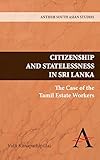Citizenship and Statelessness in Sri Lanka : The Case of the Tamil Estate Workers.
Material type: TextSeries: Anthem South Asian StudiesPublisher: London : Anthem Press, 2009Copyright date: ©2009Edition: 1st edDescription: 1 online resource (244 pages)Content type: text Media type: computer Carrier type: online resourceISBN: 9781843318071Subject(s): Tamil (Indic people) -Genre/Form: Electronic books.Additional physical formats: Print version:: Citizenship and Statelessness in Sri Lanka : The Case of the Tamil Estate WorkersDDC classification: 305.89 LOC classification: 2009026602Online resources: Click to View
TextSeries: Anthem South Asian StudiesPublisher: London : Anthem Press, 2009Copyright date: ©2009Edition: 1st edDescription: 1 online resource (244 pages)Content type: text Media type: computer Carrier type: online resourceISBN: 9781843318071Subject(s): Tamil (Indic people) -Genre/Form: Electronic books.Additional physical formats: Print version:: Citizenship and Statelessness in Sri Lanka : The Case of the Tamil Estate WorkersDDC classification: 305.89 LOC classification: 2009026602Online resources: Click to View Citizenship and Statelessness in Sri Lanka -- Citizenship and Statelessness in Sri Lanka -- TABLE OF CONTENTS -- Map of Sri Lanka -- PREFACE -- ACKNOWLEDGEMENTS -- ABBREVIATIONS -- CURRENCY EQUIVALENTS -- Citizenship and Statelessness in Sri Lanka -- Chapter 1 RAISING QUESTIONS -- Introduction -- Postcolonial Context -- Questions -- Method Adopted -- Chapter 2 COLONIALISM: THE BURDEN OF HISTORY -- Introduction -- The Land and the People -- Colonial Rule and its Unifying Tendencies -- The Plantations: Backbone of the Colonial Economy -- Land and Labor for the Plantations -- Transformation of Pre-existing Social Relations -- Emergence of Local-level Political Participation -- India's Concerns -- Gendered History -- Conclusion -- Chapter 3 1948: DISENFRANCHISEMENT -- Political Background -- The Exclusion of a Minority -- Gendered Citizenship -- The Administration of the Acts -- Response to the Acts -- The Reaction from the Estate Laborers -- Response from Women -- Economic Imperatives -- Electoral Imperatives -- The Left vs. the UNP at Independence -- The Left-wing Parties: Their Actions -- The UNP: Its Response -- In Parliament -- In Support of Kandyan Interests -- The Impact of the Citizenship Acts -- Loss of Representation: Indian Tamils and the Left-wing Parties -- Increased Representation: The Sinhalese -- Citizenship: Its Ethnic and Ideological Markers -- Citizenship: Denominator of Independent Nationhood -- Ceylonese Nationalism or Sinhala Nationalism -- The Blurring of Borders -- Women and Ethnic Processes -- The Dynamics of India's Involvement -- Conclusion -- Chapter 4 1954: THE AGREEMENT THAT FAILED -- Introduction -- The Agreements -- Significant Aspects -- Compulsions for the Agreements -- Mainly Electoral -- Winds of Change: Emerging Political Trends -- The Shift in India's Position -- The Failure of the 1954 Agreement.
The Representatives of the Estate Laborers -- The Estate Laborers -- Opposition Parties and the Agreement -- Disagreement Between India and Sri Lanka -- The Presence of Statelessness -- Conclusion -- Chapter 5 1964: THE AGREEMENT THAT "SUCCEEDED" -- Introduction -- The Agreement -- A Question of Economics? -- Electoral Imperatives Mediated by Kandyan Interests -- Reasons for Acceptance -- The Support of the UNP -- The Support of the Left-wing Parties -- The Planters -- The Representatives of the Indian Tamils -- Those Who Resisted -- The Estate Laborers -- The Representatives of the Sri Lankan Tamils -- Nationalist Parties -- India: a Shift in Policy -- Conclusion -- Chapter 6 1967: THE START OF THE IMPLEMENTATION -- The Departure -- Introduction -- -- The Impact of Particular Political Alliances -- Financial Considerations -- Response of the Planters -- The Agency of the Estate Laborers -- India's Contribution to the Delay -- Opposition to the Implementation Act -- Leaving -- Case Study: Perummal's Journey to India -- Conclusion -- Chapter 7 1970-1977: "SIRIMA TIMES" - PRESSURE TO LEAVE -- Introduction -- Background -- "We Felt We Were Forced to Go" -- Exclusion of Two Minorities -- Policies that Resulted in Increased Repatriation -- Nationalization of the Estates -- "We Remember Only Famine and Starvation" -- Political Vindictiveness -- Another Agreement with India -- Propaganda about India -- Response of the Tamil Minorities -- Response of the Sri Lankan Tamils -- Response of the Hill-country Tamils -- Resistance and Identity Formation -- Continued Silence -- Rehabilitation in India -- Unfulfilled Promises -- The Rehabilitation Schemes -- Return to the Ancestral Villages -- Attitudes Toward the Repatriates -- The Missing Category -- In Search of Tea Estates -- Impact on Family and Kinship -- Conclusion -- Chapter 8 1988: THE END OF A SAGA.
Introduction -- Centralization of Power -- While Speaking of a "Dharmista" Way of Life -- Tamil Militancy: a Threat -- The Power of the Estate Laborers -- A Question of Economics -- The CWC: At the Right Place at the Right Time -- The Threat from India -- Conclusion -- Chapter 9 RETROSPECTION -- Innovative Aspects -- NOTES -- Abbreviations -- Chapter 1 Raising Questions -- Chapter 2 Colonialism the Burden of History -- Chapter 3 1948: Disenfranchisement -- Chapter 4 1954: The Agreement that Failed -- Chapter 5 1964: The Agreement that "Succeeded" -- Chapter 6 1967: The Start of the Implementation -- Chapter 7 1970-1977: "Sirima Times" - Pressure to Leave -- Chapter 8 The End of a Saga -- Chapter 9 Retrospection -- Bibliography -- BIBLIOGRAPHY -- I. Newspapers1 -- II. Pamphlets and Magazines2 -- III. Public Documents3 -- IV. Sessional Papers4 -- V. Plantation Sector5 -- VI. Unpublished -- VII. Books and Articles -- APPENDIX -- GLOSSARY -- INDEX.
'Citizenship and Statelessness in Sri Lanka' analyses the context of the agreement between the Sri Lankan and Indian government that led to the loss of citizenship of Indian Tamil estate workers in Sri Lanka.
Description based on publisher supplied metadata and other sources.
Electronic reproduction. Ann Arbor, Michigan : ProQuest Ebook Central, 2018. Available via World Wide Web. Access may be limited to ProQuest Ebook Central affiliated libraries.

There are no comments on this title.